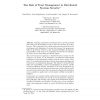Free Online Productivity Tools
i2Speak
i2Symbol
i2OCR
iTex2Img
iWeb2Print
iWeb2Shot
i2Type
iPdf2Split
iPdf2Merge
i2Bopomofo
i2Arabic
i2Style
i2Image
i2PDF
iLatex2Rtf
Sci2ools
130
click to vote
ECOOPW
1999
Springer
1999
Springer
The Role of Trust Management in Distributed Systems Security
Existing authorization mechanisms fail to provide powerful and robust tools for handling security at the scale necessary for today's Internet. These mechanisms are coming under increasing strain from the development and deployment of systems that increase the programmability of the Internet. Moreover, this increased exibility through programmability" trend seems to be accelerating with the advent of proposals such as Active Networking and Mobile Agents. The trust-management approach to distributed-system security was developed as an answer to the inadequacy of traditional authorization mechanisms. Trust-management engines avoid the need to resolve identities" in an authorization decision. Instead, they express privileges and restrictions in a programming language. This allows for increased exibility and expressibility, as well as standardization of modern, scalable security mechanisms. Further advantages of the trust-management approach include proofs that requested tran...
Authorization Mechanisms | Distributed And Parallel Computing | ECOOPW 1999 | Trust-management Approach | Trust-management Engines |
Related Content
| Added | 04 Aug 2010 |
| Updated | 04 Aug 2010 |
| Type | Conference |
| Year | 1999 |
| Where | ECOOPW |
| Authors | Matt Blaze, Joan Feigenbaum, Angelos D. Keromytis |
Comments (0)

